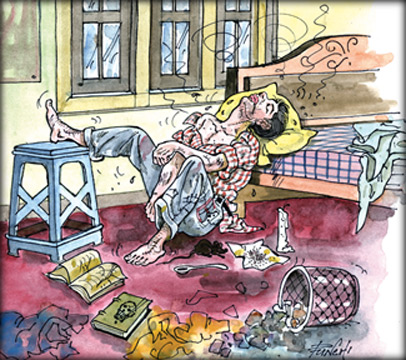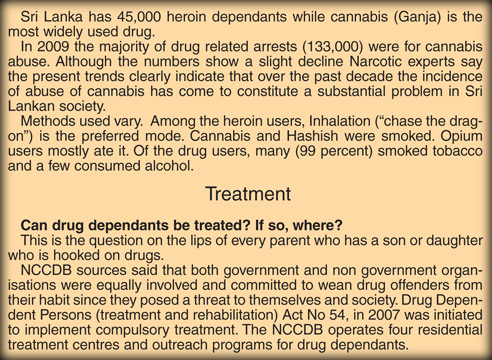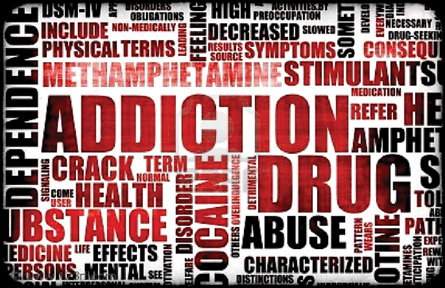Is your son drug dependent?
By Carol Aloysius
Nimal was elated when his parents gave him permission to take four
closest friends to a nightclub for his 17th birthday. Once they arrived
at the club, Nimal called for a round of wine to celebrate his special
day. This was followed by beer and whisky. By the time the foursome left
the club, they were so intoxicated by their mix of alcoholic drinks they
could barely stand. Staggering out of the club they began club hopping,
ended their day experimenting with hard drugs.
It was Nimal’s first taste of heroin and it changed his life
drastically.
 Clamouring for more of the addictive substance his school grades and
school attendance began to decline. So did his behaviour along with his
sleeping and eating habits, the way he dressed, and talked. Clamouring for more of the addictive substance his school grades and
school attendance began to decline. So did his behaviour along with his
sleeping and eating habits, the way he dressed, and talked.
A well mannered, polite boy by nature, he stopped studying and
instead listened to loud music till late night, waking up long after his
school had begun. His toilet habits changed to the point of not even
washing his face or brushing teeth.
The previously clothes- conscious teenager, also began dressing
carelessly insisting on going to school wearing rubber slippers. His
shocked parents would frequently hear him swearing and using street
language - the kind that drug addicts used.
Distressed and dismayed at his sudden inexplicable behaviour they
finally persuaded him to visit the General Practitioner who had treated
Nimal as a baby. They were shocked to learn that their only son had
become a drug addict.
Silver lining
The silver lining in their cloud of despair, they told this writer in
retrospect, was that once he had realised the cause for his confused and
disorderly manner, Nimal was willing to get himself treated at a drug
rehabilitation centre. Warned that the treatment would not bring
overnight miracles and that he needed to be detoxified, counselled and
rehabilitated, he was willing to go ahead, rather than slip further into
the dark world of drugs that had obsessed him.
“Today our son is on his way to recovery. What’s more, he has gone
back to his studies and wants to fulfil his dreams of becoming an
engineer, like his father”, says his happy mother.
Growing problem
Drug abuse is a growing problem in Sri Lanka. Tragically, most
addicts worldwide and in Sri Lanka are now getting hooked on various
substances at a young age due partly to the free flow of illegal
narcotics into the country via the golden triangle from Afghanistan, to
Pakistan to Sri Lanka. According to the Handbook of Drug Abuse 2010
published by the National Dangerous Drugs Control Board (NDDCB) the
total number of drug related arrests in 2009 was 18,743, with 68 percent
in the age of 30 or more and 30 percent in their twenties. The vast
majority were males who hailed mostly from the Western Province (48
percent) followed by the southern Province (13 percent) and Central
Province (10 percent). The prevalence of drug related arrests above 14
years was 125 persons per population of 100,000.
What are these narcotics? Why do people abandon comfortable lives and
go in search of them in street corners and alleys? How do you define a
drug?
A drug, according to informed sources, is a chemical substance which
when it enters the human body causes a considerable amount of damage in
that system. Alcohol is one such drug. So is tobacco. And so are ganja
or cannabis, as well as hashish and marijuana which are two of its
preparations.
Explaining their deadly health impacts, a medical expert said, “They
can cause wide ranging damage to the brain, liver, thinking and even
drive a person to madness. Take Ganja. In the brain it causes a
derangement of perception, so that a person under its influence fails to
appreciate the reality of time, distance, speed. If a pregnant woman
uses this substance it can affect the brain of her unborn child. People
who have taken this substance for a long time develop a mental stage in
which they become devoid of all drive. This is called an amotivational
stage.”
While Opium is now a substance of the past, heroin, the white powder
derived from the main alkaloid chemical found in opium is in current
use. “There are two significant characteristics of heroin”, our medical
source pointed out. “Firstly, it creates dependence - a state where one
develops an overpowering desire to continue taking the drug and his
priority is directed at obtaining that substance, even if it meant
stealing or even killing for it.
 Secondly, it is a habit that is hard to kick. When habitual users
want to stop, they develop temporary withdrawal symptoms, such as loose
stools, insomnia, shivering, yawning, hair standing on end, abdominal
pain, bone and joint pain. Secondly, it is a habit that is hard to kick. When habitual users
want to stop, they develop temporary withdrawal symptoms, such as loose
stools, insomnia, shivering, yawning, hair standing on end, abdominal
pain, bone and joint pain.
So how does this habit start? What are the signs?
Nimal’s GP says, “Usually dependence creeps stealthily on people,
especially young people and begins to affect their school work, their
sports, their behaviour, as in the case of Nimal. They experience mood
changes, language changes often slang words and phrases in drug taking
strata of society. Moods of drug users can change from elation to
depression and bursts of violence. Parents must watch out for repeated
thefts in the home including money and jewellery. Drug addiction leads
to personal degradation. It must be treated and the patient must want to
give up the habit,” he said.
Recognition of the problem is the first step to curing it, as it will
motivate people to seek help.”
Why only some?
According to consultant psychiatrist Dr Indika Mudalige, “no single
factor can predict whether a person will become addicted to drugs. The
risk factors for addiction are high by a combination of factors. They
include individual biology (the genes people are born with) in
combination with environmental influences. A person’s environment
includes many different influences from friends and family to socio
economic status and quality of life. Factors such as peer pressure, poor
parenting can greatly influence the occurrence of drug abuse and
escalation to addiction. Genetic and environmental factors interact with
the critical development stages of a person’s life. Though taking drugs
at any age can lead to addiction, the earlier drug use begins the more
likely it will progress to serious abuse which poses a special challenge
to adolescents because areas in their brains that govern decision
making, judgement and self control are still developing. So, adolescents
are especially prone to risky behaviour including drug abuse”.
Treatment?
Doctors can help a patient by reducing the substitute drugs doses.
But the patient may also need vitamins and nutritional supplements. In
some, the patient’s thinking has to be adjusted and requires
psychotherapy some require social readjustment and rehabilitation, he
said.
Treating new and habitual drug addicts is today part of our Drug
Control activities, a spokesperson from the NCCDB said. “Both government
and non government organisations are currently committed to wean drug
offenders from their habit since they pose a threat to themselves and
society. Drug Dependent Persons (treatment and rehabilitation) Act No
54, in 2007 was initiated to implement compulsory treatment. It operates
four residential treatment centres and outreach programs for drug
dependants. The NDDCB also operates four residential treatment centres
and outreach programs for drug dependants. The centres located in
Colombo, Kandy, Galle and Urapola provide residential care treatment and
rehabilitation services, besides functioning as preventive and outreach
arms of the Board.
The program operating at these centres include; individual and family
counselling, detoxification, physical exercise, mental relation, indoor
and outdoor activities, psychotherapy, education in coping with skills
and most importantly, motivation to develop healthy life styles.
While these programs are commendable, much more needs to be done.
Today the drug menace has seeped into every fabric of our society;
starting with schools, universities and other educational institutes.
Hence the need of the hour is a comprehensive meaningful program to
educate, prevent, inform, and motivate young persons adopt healthy
lifestyles, be initiated islandwide. Due to the frightening
repercussions of drug dependency, there has to be some form of
compulsion for all drug addicts to seek treatment. It is thus vital for
the community to build networks from grass root level up to priests,
teachers, parents to identify would-be or already addicted persons, by
monitoring habits and behaviour patterns of high risk groups, and then
persuade them to seek treatment.
 Admitting young drug addicts to prison is not the answer. They must
be sent to treatment centres and rehabilitated. Treatment must be
tailored to suit each dependent since no single therapy will be suitable
to all drug dependants. Offering different types of treatment, with
medical interventions combined with counselling and other behavioural
therapies is vital, says a sociologist. Admitting young drug addicts to prison is not the answer. They must
be sent to treatment centres and rehabilitated. Treatment must be
tailored to suit each dependent since no single therapy will be suitable
to all drug dependants. Offering different types of treatment, with
medical interventions combined with counselling and other behavioural
therapies is vital, says a sociologist.
It is encouraging to note that under the revised national policy for
drug control by the NCCDB, some of these initiatives have already been
put in place.
But the key word is to sustain them. This can only be achieved if all
treatment programs are humane, affordable and cost effective.
Living as we are in a violent society where morals are rapidly being
eroded and poverty is on the increase, thousands of young disillusioned
people are looking for ways to escape from the stresses and strains of
everyday living. Our future citizens can be protected from further moral
decadence, and self destruction, if we collectively help put them back
on the right track.
Organisations such as SLANA (Sri Lanka Anti Narcotics Association),
Mel Medura and the NCCDB have been established for just this purpose.
If you suspect a friend, neighbour or even your son or daughter of
substance abuse, call them. Or better still, accompany them to a centre
where they can seek counselling and remedial treatment without delay.
Tomorrow may be too late.
|

